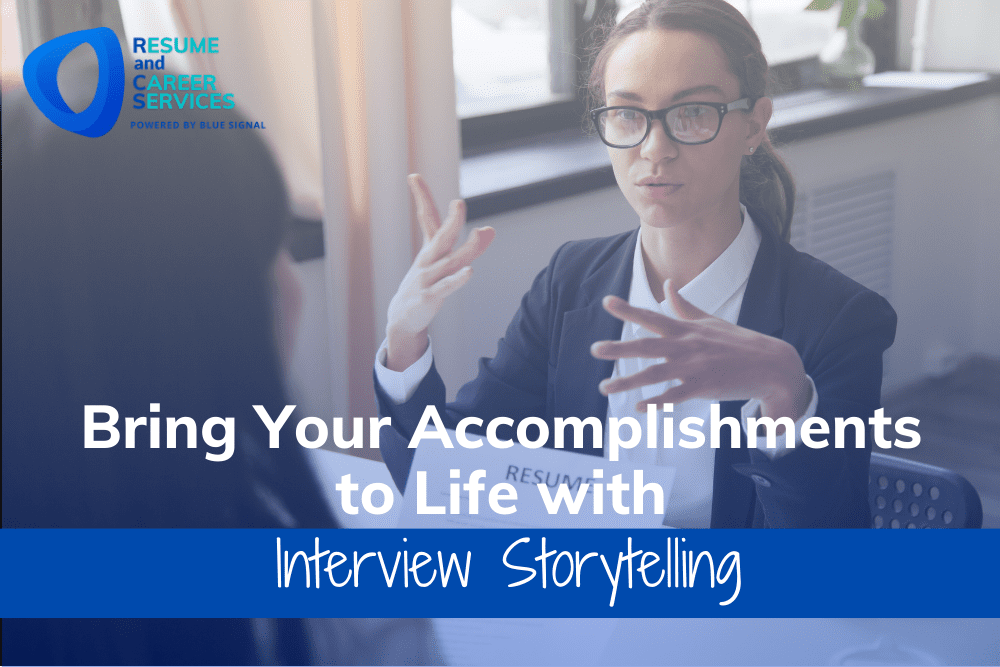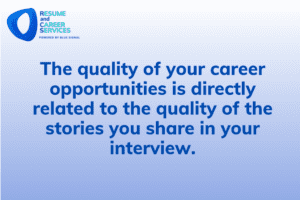Bring Your Accomplishments to Life with Interview Storytelling

As you’re preparing for your next job interview, it’s crucial to be able to share your accomplishments with decision makers during that meeting. But it goes beyond just telling the interviewer a list of your achievements; you need to tell a compelling story. Interview storytelling is what engages listeners and brings those accomplishments to life. And since stories sell, the more you can present your accomplishments as stories, the better chance you’ll have of transforming interviews into job offers.
Beyond the Traditional Framework: Add Depth to Your Narrative
When writing accomplishments to add to your resume, we suggest the using the framework of challenge, action, and result (or CAR), which gets to the heart of the matter quickly. On a resume, you’ll only include the result and action, omitting the challenge, because the goal there is to secure you an interview, so the whole story isn’t needed. An interview, however, is a completely different animal, and stories can make a huge difference.
Interview storytelling brings those CAR statements to life. This will allow you to delve into the nuances of your accomplishments. By adding context, you create a foundation for your story that makes it more relatable and compelling. Context will include setting the scene with a brief background that helps the interviewer to understand the situation in which your accomplishment occurred.
Additionally, emotion can elevate the aspects of your story. When you’re passionate and enthusiastic, your interview committee will sense that. It should go without saying that you don’t want to share a sad story, but one that illustrates how you overcame challenges and emerged with a winning outcome can really leave an impression.
Bring Your Contributions to Life by Highlighting Company Impact
While your resume accomplishments are limited in scope, expanding on them during an interview allows you to add depth and bring them to life. In a one-on-one setting, don’t just spew facts; emphasize the effect your actions had on the company or stakeholders. Paint a vivid picture of the challenges the organization was facing and how your actions led to positive outcomes.
Here’s an example:
Your resume may say, “Generated 23% YOY revenue growth after revitalizing revenue and customer-experience processes.” This is a great accomplishment and says a lot, but there’s always more to the story.
Take your interview storytelling to the next level. Illustrate how frustrated customers were in their interactions with the company. They were having challenges getting to the payment screen on the website and there was high cart abandonment. In effect, the company was losing money, and of course, there’s no way to put a number on how much loss there was. But when you reworked the system and made it easier to find and use the payment option, not only did you stop losing as many potential customers, but you also saw a marked increase in revenue growth.
Showcase Skills and Strengths in Interview Storytelling
Effective interview storytelling puts an emphasis on accomplishments, but this is also an excellent method for highlighting all the skills and talents you used to bring that accomplishment to fruition. In the above example, the candidate could have been the website developer who spotted the problem and took charge, creating a stronger workaround by using his coding skills. Or he could be a sales leader who heard from customers how frustrated they were, and he took those concerns to the website team and facilitated a solution. Either way, many skills were brought to bear to create that significant outcome.
Share those skills during your interview.
A Step-by-Step Guide to Telling Your Story
Follow these steps to craft your interview storytelling, and you’ll be ready to wow your future employer.
- Choose the right story.
Consider the accomplishments that align with the position for which you’re interviewing. If you have enough wins, choose a story that highlights a range of skills and the versatility you offer. - Set the stage.
Provide context to the story by starting with the challenge you were facing. Then clearly articulate the goal of overcoming that challenge. - Add drama.
Every good story has a little bit of drama, or tension. Describe the difficulties you faced in reaching your outcome, including the potential consequences if the situation were to have continued unresolved or you failed in your efforts. - Explain your actions.
Don’t overlook what you did to overcome the challenge you were facing. Get granular, if needed, and emphasize how you took charge or participated as part of the team. Describe the reasons you did what you did. - Quantify the impact.
This is the good stuff: Did you save money? Make money? Improve processes? Make people happy? Use metrics to quantify your efforts whenever possible. - Share what you learned.
Accomplishments are empty unless you learned something from them. Did you grow personally through the experience? Did it unite your team or result in a promotion? What about feedback from the people who were affected? This is all ideal to share to highlight how you adapted and improved. - Connect the story to the role.
Stories are great, and they’ll engage your audience, but they must have a correlation to the position for which you’re interviewing. Tie the story back to the skills and strengths needed in this role. Bonus points if you are able to share stories that directly pertain to challenges this new company is facing.
It’s Time to Elevate Your Interview Performance
When you are at an interview, you are on your own little stage, and you must give the performance of a lifetime. Fortunately, interview storytelling provides you with a solid tool to do just that. By starting with the CAR accomplishment framework and expanding it to include the impact you had on the team, company, and yourself, you’ll position yourself as a critical thinker and strategic problem solver. Plus, you’ll highlight all the skills and strengths you have that the employer is seeking for its new hire.
By preparing stories ahead of the interview and practicing your delivery, you’ll go beyond merely answering questions. Instead, you’ll leave a lasting impression that sets you apart from the competition as a candidate who offers a unique and valuable perspective in the face of challenges.
Interview preparation is just one of the tools Resume and Career Services offers. Learn more about how we can help accelerate your job search on our website or through our learning library on YouTube.
